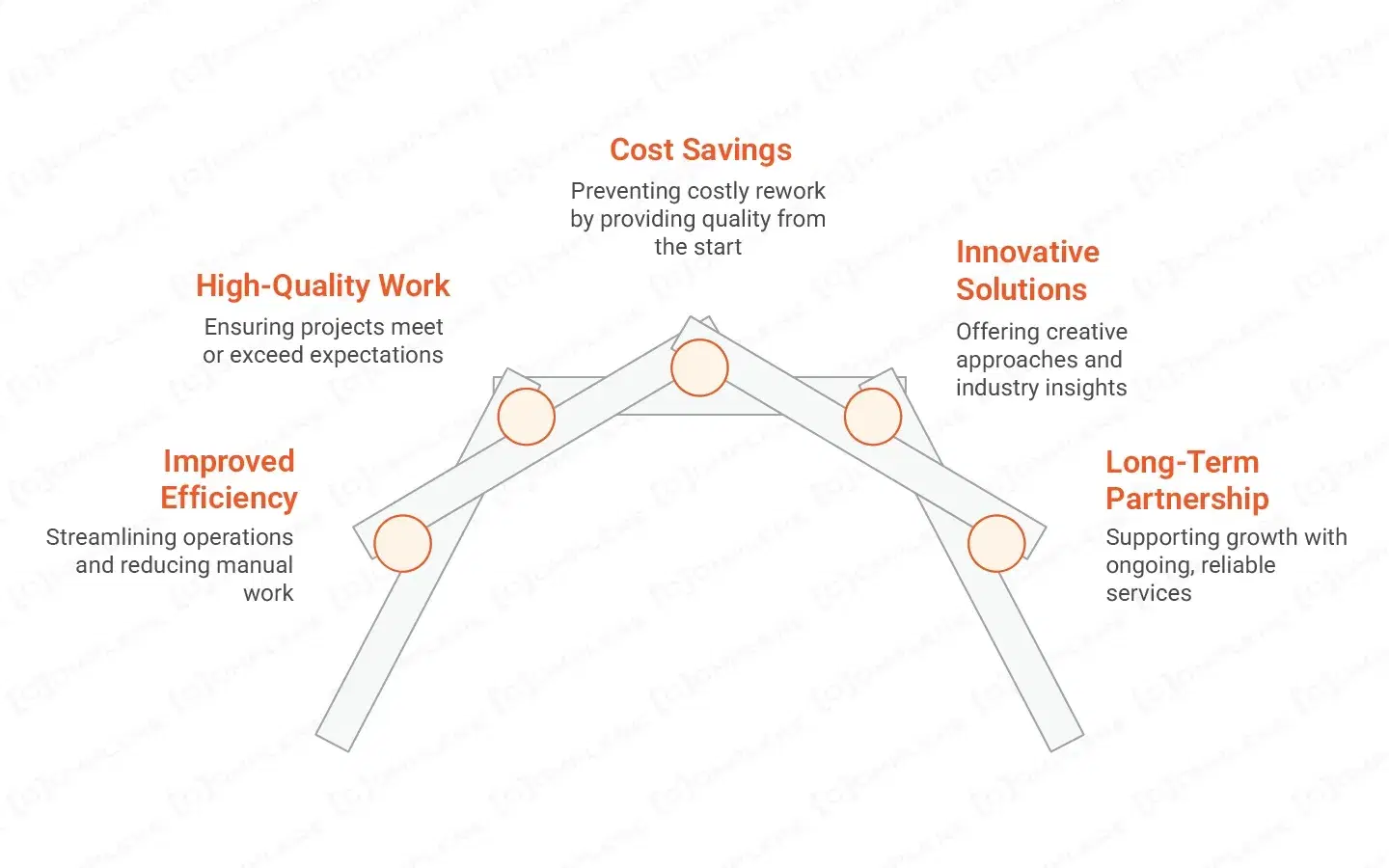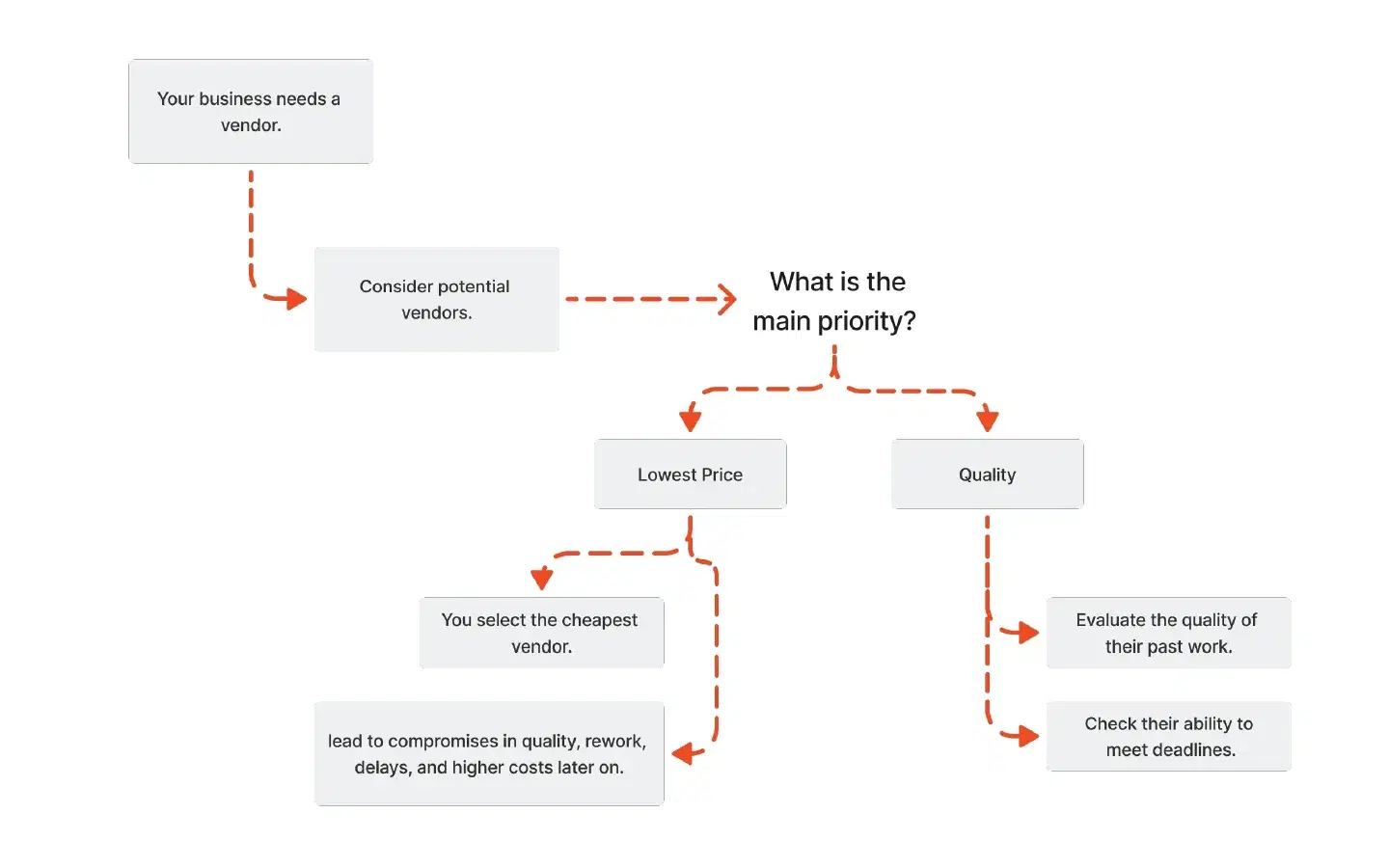Choosing the right vendor for your business is a crucial decision that can impact the success of your projects and overall business operations. In today’s competitive environment, businesses must prioritize vendor selection carefully to ensure they align with their goals, values, and quality standards. A reliable vendor can become a trusted partner, contributing to business optimization and long-term success. On the other hand, choosing the wrong vendor can lead to costly mistakes, delays, and compromised quality.
Explore step-by-step guide, we will walk you through the process of selecting a vendor for business and highlight the key factors to consider when evaluating potential partners.
The Impact of Choosing the Right Vendor?
The right vendor for your business can be a game-changer, bringing in expertise, efficiency, and long-term growth. A reliable vendor goes beyond just delivering products or services. They become a true partner in your business’s success. Here’s what the right vendor can bring to your business:

- Improved Efficiency: Streamlining operations and reducing manual work.
- High-Quality Work: Ensuring that projects meet or exceed your expectations.
- Cost Savings: Preventing costly rework by providing quality from the start.
- Innovative Solutions: Offering creative approaches and industry insights.
- Long-Term Partnership: Supporting your growth with ongoing, reliable services.
How to Choose the Right Vendor for Your Business?
Choosing the right vendor for your business is important for ensuring project success and long-term growth. A trusted vendor can help optimize operations, improve efficiency, and deliver high-quality work. In this guide, we’ll walk you through the essential steps to find the perfect vendor who aligns with your goals and values. Explore five key factors that will set you up for success in selecting the right partner.
1. Conduct a Thorough Vendor Evaluation
The first step in choosing the right vendor for your business is to evaluate potential candidates. Start by researching and shortlisting vendors who specialize in the service or product you need. This is where vendor evaluation becomes crucial. Consider their experience, expertise, and previous work with other clients.
Look for reliable vendors with a strong track record of delivering successful projects. Pay attention to their customer reviews and testimonials to gauge their reputation. Reliable vendors will provide a solid portfolio and will not hesitate to share details about their past performance.
2. Prioritize Quality Over Pricing
It’s tempting to go for the cheapest option, but when it comes to choosing a vendor for your business, quality should always take precedence. Low prices often mean compromises in quality, which can lead to rework, delays, and ultimately, higher costs in the long run.

Instead, focus on the vendor performance and how well they can meet your expectations. Assess the quality of their previous work, their ability to meet deadlines, and their attention to detail. Remember, investing in a high-quality vendor can significantly enhance business optimization by ensuring smooth operations and minimizing future complications.
3. Ensure Vendor Accountability
Accountability is a key factor that distinguishes a great vendor for your business from an average one. A vendor who is accountable will take responsibility for their actions and deliver on their promises. They will communicate clearly about timelines, costs, and potential challenges, ensuring there are no surprises.
When evaluating a potential vendor, ask about their proof of concept and previous client interactions. A reputable vendor should be willing to show how they managed previous projects and address any concerns you might have. Vendor accountability is not just about meeting expectations but also about maintaining open communication throughout the project.
4. Ask for Proof of Work and References
Before finalizing any agreement, always ask for proof of work such as case studies, white papers, or client portfolios. These materials give you an in-depth look at the vendor’s capabilities and work quality. At Complere Infosystem, for example, we offer proof of concept to demonstrate the quality of our work before committing to a long-term partnership. Reliable vendors should be able to provide a list of previous clients who can speak about their experiences. This helps you get a real sense of how the vendor works and whether they align with your business needs.
5. Assess the Long-Term Partnership Potential
A good vendor for your business isn’t just a one-time service provider; they should be able to evolve with your business and contribute to long-term success. Business partnerships built on trust and shared goals tend to yield the best results.
When selecting a vendor, consider whether they are willing to collaborate and grow with your business over time. A strong partnership can bring ongoing support, adaptability, and continuous improvement in business optimization.
5 Critical Mistakes to Avoid When Choosing a Vendor: Watch This Before You Decide
Before you sign that vendor contract, make sure you're not falling into common traps! Tune into this video to learn how to avoid costly mistakes and choose the best partner for your business.
5 Critical Mistakes to Avoid When Choosing a Vendor | Isha Taneja
5 Critical Mistakes to Avoid When Choosing a Vendor | Isha Taneja
Final Verdict
Choosing the right vendor for your business is more than just picking someone to complete a task. It’s about building a relationship with a reliable partner who can help you achieve project success and optimize your business operations. By following the steps outlined above, conducting thorough evaluations, prioritizing quality. This ensures accountability, asking for proof of work, and fostering long-term partnerships. So, you can make a decision that sets your business up for success.
Ready to choose the right vendor for your business? Click here to start your vendor evaluation today and ensure long-term success for your company.












